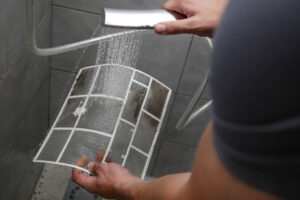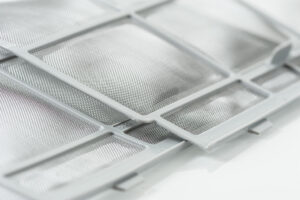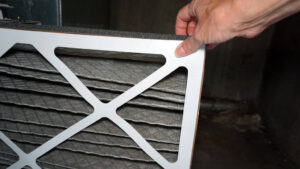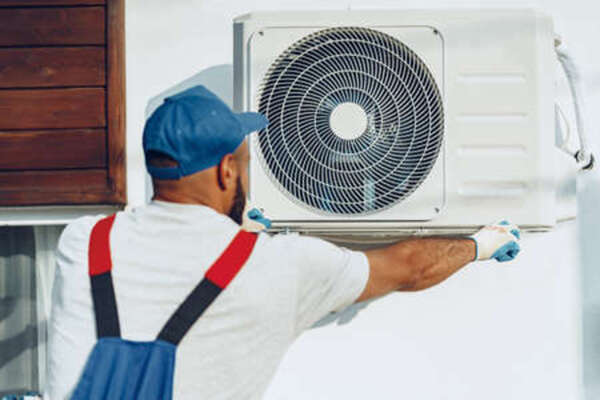Air Conditioner Filter Installation & Cleaning Services
In Search of a Professional Air Conditioning Filter Service?
Air conditioning filters play a crucial role in maintaining the quality of air that circulates in your home or workplace. These filters are responsible for trapping pollutants and debris, including dust, pollen, and pet dander, that would otherwise circulate in the air. Over time, these filters become dirty and clogged, reducing the efficiency of your air conditioning system and potentially leading to poor indoor air quality.
To maintain clean and healthy air, it is important to clean and replace your air conditioning filters regularly. Cleaning the filters involves removing any accumulated debris and dust, whereas replacing them involves swapping out the old filter for a new one. The frequency of cleaning and replacement will depend on several factors, including the type of filter you have, how often you use your air conditioning system and the level of pollutants in your environment.
By regularly cleaning and replacing your air conditioning filters, you can ensure that your system operates efficiently and effectively and that the air in your home or workplace remains clean and healthy.
Air Con Filter Cleaning service
Air conditioning filters are an essential component of any air conditioning system and play a crucial role in maintaining clean and healthy indoor air quality. Over time, however, these filters become clogged with dust, dirt, and other pollutants, which can negatively impact the efficiency of your air conditioning system and the air quality in your home or workplace.
It is important to clean your air conditioning filters regularly to address this issue. Cleaning the filters involves removing any accumulated debris and dust, which will improve the overall efficiency of your system and reduce the likelihood of air pollutants circulating in your indoor environment.
To clean your air conditioning filters, you should first turn off the system and remove the filter from its housing. You can then use a soft brush or vacuum to remove any debris from the surface of the filter gently. Some filters may be washable, so you can rinse them with water and allow them to air dry completely before reinserting them into the housing. You will need to replace disposable filters with a new ones after cleaning. We always recommend hiring one of our professionals to clean or replace your AC filters.
Regularly cleaning your air conditioning filters is an integral part of maintaining the efficiency and effectiveness of your air conditioning system and ensuring clean and healthy indoor air quality for you and your family or colleagues.
Why do I need an Expert Air conditioning filter cleaning Technician?
While cleaning or replacing air conditioning filters is an essential maintenance task, you may be wondering whether you need to hire an expert air conditioner filter service to do it for you. The answer depends on several factors.
Suppose you are comfortable working with your air conditioning system and are familiar with the maintenance requirements. In that case, you can clean or replace your air conditioning filters. However, if you need clarification on the process or have a complex system requiring specialised knowledge, it may be best to seek the help of an expert.
An expert air conditioner filter service can help you to ensure that your filters are cleaned or replaced correctly and efficiently, which can help to extend the lifespan of your system and maintain clean and healthy indoor air quality. It can provide peace of mind, as you can be confident that your system is in good hands.
Ultimately, whether you choose to hire an expert air conditioner filter service will depend on your level of knowledge and comfort with air conditioning maintenance and the complexity of your system.
Types of Air Conditioner Filters
There are several air conditioner filters, including fibreglass, pleated, electrostatic, HEPA, and washable/reusable filters. The type of filter you choose will depend on your needs and the level of pollutants in your indoor environment.
HEPA Filters
HEPA filters are high-efficiency particulate air filters designed to remove at least 99.97% of airborne particles, including dust, pollen, and bacteria. These filters are highly effective at improving indoor air quality, making them a popular choice for people with allergies or respiratory conditions.

UV Filters
UV filters use ultraviolet light to kill bacteria, viruses, and other airborne microorganisms. They are often used with other air filters to improve indoor air quality, particularly in areas with high levels of pollutants or environments where infectious diseases are a concern.

Electrostatic Filters
Electrostatic filters use static electricity to trap airborne particles, including dust, pollen, and pet dander. These filters are reusable and can be washed and cleaned, making them a more eco-friendly option than disposable filters. They are also effective at reducing odours and improving indoor air quality.

Washable Filters
Washable filters are reusable and can be cleaned and reinserted into your air conditioning system. These filters are more eco-friendly than disposable filters, and they can effectively remove pollutants from the air. However, they may not be as effective as HEPA filters or other high-efficiency options.

Spun Glass Filters
Spun glass filters are made from fine glass fibres spun into a web-like pattern. These filters are disposable and are typically less expensive than other options, but they may need to be more effective at removing smaller particles from the air. They are often used in residential settings with low levels of pollutants.

Pleated Filters
Pleated filters are made from folded sheets of filter material designed to capture larger particles such as dust and pollen. They are generally more effective than spun glass filters but may not be as efficient as HEPA or electrostatic filters. They are a good option for residential settings with moderate levels of pollutants.

Quality AC Filter Replacement Service Near me
Quality AC filter replacement is an important part of maintaining the efficiency and effectiveness of your air conditioning system and ensuring clean and healthy indoor air quality. When replacing your AC filter, choosing a high-quality one appropriate for your system and indoor environment is important. Look for filters with a MERV (Minimum Efficiency Reporting Value) rating of at least 8 to ensure they can effectively capture pollutants and improve air quality. It is also important to replace your filter regularly, with the replacement frequency depending on the contaminants in your indoor environment. You can always count on Accustom Air for quality AC filter replacement to ensure that you and your family or colleagues breathe clean and healthy air.

Importance of Clean Air Conditioning Filters
Clean air conditioning filters are crucial for maintaining your air conditioning system’s efficiency and effectiveness and improving indoor air quality. When your air conditioning filter is dirty or clogged with debris, it can cause your system to work harder, using more energy and increasing the risk of breakdowns or malfunctions. Dirty filters can also reduce the airflow and efficiency of your system, which can cause your indoor environment to become uncomfortable and stuffy.
Additionally, clean air conditioning filters can help to remove pollutants from the air, such as dust, pollen, and pet dander, improving indoor air quality and reducing the risk of allergies and respiratory problems. Regular filter cleaning or replacement is especially important for people with allergies or asthma, as dirty filters can exacerbate symptoms.
To ensure clean and healthy indoor air quality and maintain the efficiency of your air conditioning system, it is important to clean or replace your filters regularly. This will save you money on energy bills and prevent costly repairs and help create a comfortable and healthy living or working environment.
How to Clean Ducted Air Conditioner Filter
Cleaning the ducted air conditioner filter is an important maintenance task that can help improve the efficiency and performance of your air conditioning system. Here are the steps for cleaning your ducted air conditioner filter:
- Turn off the air conditioner: Before starting, turn off the air conditioner and disconnect the power supply.
- Remove the filter: Locate it and remove it from the air conditioning system. You may need to unscrew a panel or release a latch to access the filter.
- Vacuum the filter: Use a vacuum cleaner with a soft brush attachment to remove any dust, dirt or debris from the filter.
- Wash the filter: Depending on your filter type, you can wash it under running water or soak it in warm water and mild detergent. Rinse the filter thoroughly and let it dry completely before reinstalling it.
- Reinstall the filter: Once it is dry, reinsert it back into the air conditioning system and secure any removed latches or panels.
Regular cleaning of your ducted air conditioner filter will help ensure that your system runs efficiently and provides clean, fresh air throughout your home or office.
Why Use Our Services
Our expert technicians have the knowledge and experience to thoroughly clean and maintain your air conditioning filters, ensuring your system runs efficiently and effectively. We use high-quality cleaning products and equipment to remove even the smallest particles and pollutants from your air conditioning filters, improving indoor air quality and reducing the risk of allergies and respiratory problems. Additionally, our services can save you time and money by preventing costly repairs and breakdowns caused by dirty filters. By choosing our AC filter cleaning services, you can have peace of mind knowing that your air conditioning system is running at its best and providing clean and healthy air for you and your loved ones.
What Clients Say About Our Services?
Clients who regularly use our services swear by the fact that we are reliable and efficient and get the job done with the best results. They value our technicians, who are knowledgeable and thorough in their work, and those who use high-quality cleaning products and equipment. Clients are also often pleased with services that save them time and money by preventing breakdowns and expensive repairs. Ultimately, everyone wants to breathe clean and healthy air in their homes or offices, and our services help achieve that goal.
FAQs
An air conditioner filter traps dust, dirt, and other airborne particles to improve indoor air quality and protect the air conditioning system. It helps prevent the buildup of pollutants in the system, leading to poor performance, higher energy bills, and potential breakdowns.
Running an AC without a filter can cause many problems, including reduced airflow, increased energy consumption, and damage to the system’s components. Dirt, dust, and other debris can accumulate in the system, potentially leading to costly repairs or breakdowns. Additionally, indoor air quality can suffer as pollutants are not being filtered out of the air.
The frequency of filter changes for an air conditioner depends on several factors, such as the type of filter, the level of use, and the indoor environment. Generally, filters should be checked every one to three months and replaced or cleaned as necessary. Homes with pets or smokers may require more frequent filter changes, while homes with fewer occupants and less dust may require less frequent changes.
Yes, it is possible to clean an AC filter yourself, depending on the type of filter and the extent of dirt and debris buildup. Many filters can be washed or vacuumed to remove dust and particles, while others may require replacement. It is important to follow the manufacturer’s recommendations and use appropriate cleaning methods to avoid damaging the filter or the air conditioning system.
The frequency of washing an AC filter depends on several factors, such as the type of filter, the level of use, and the indoor environment. Generally, filters should be checked every one to three months and washed as necessary. Homes with pets or smokers may require more frequent washing, while homes with fewer occupants and less dust may require less frequent washing.
Yes, many AC filters can be cleaned instead of replaced, depending on the type of filter and the extent of dirt and debris buildup. However, some filters may need to be replaced to maintain optimal performance and indoor air quality.
If you clean an air conditioner filter, it can avoid becoming clogged with dirt and debris, reducing airflow and causing the system to work harder and use more energy. This can lead to increased energy bills, reduced indoor air quality, and damage to the system’s components, potentially leading to costly repairs or breakdowns.
You can tell if an AC filter is too dirty by inspecting it visually for a buildup of dust and debris. Additionally, reduced airflow decreased indoor air quality, and increased energy bills may indicate that the filter needs cleaning or replacement.
If you run an AC with a dirty filter, it can cause the system to work harder and use more energy, potentially leading to increased energy bills and reduced indoor air quality. Additionally, a dirty filter can cause the system’s components clogged with debris, potentially leading to costly repairs or breakdowns.
The lifespan of an AC filter depends on several factors, such as the type of filter, the level of use, and the indoor environment. Generally, filters should be checked every one to three months and replaced or cleaned as necessary. It is important to consult the manufacturer’s recommendations and consult a professional for filter maintenance guidance.
Cleaning an AC filter can improve the airflow and efficiency of the system, potentially leading to cooler indoor temperatures. However, the extent of the temperature change depends on several factors, such as the condition of the system and the indoor environment. It is important to consult with a professional to ensure the optimal performance of the AC system.
Sometimes, an AC system may turn off if the filter is too dirty, clogged, or damaged. This can be a safety feature to prevent the system from overheating or causing damage to the components. However, other factors, such as a malfunctioning thermostat or electrical issue, can cause the system to turn off. It is important to consult a professional to diagnose and address the issue.

